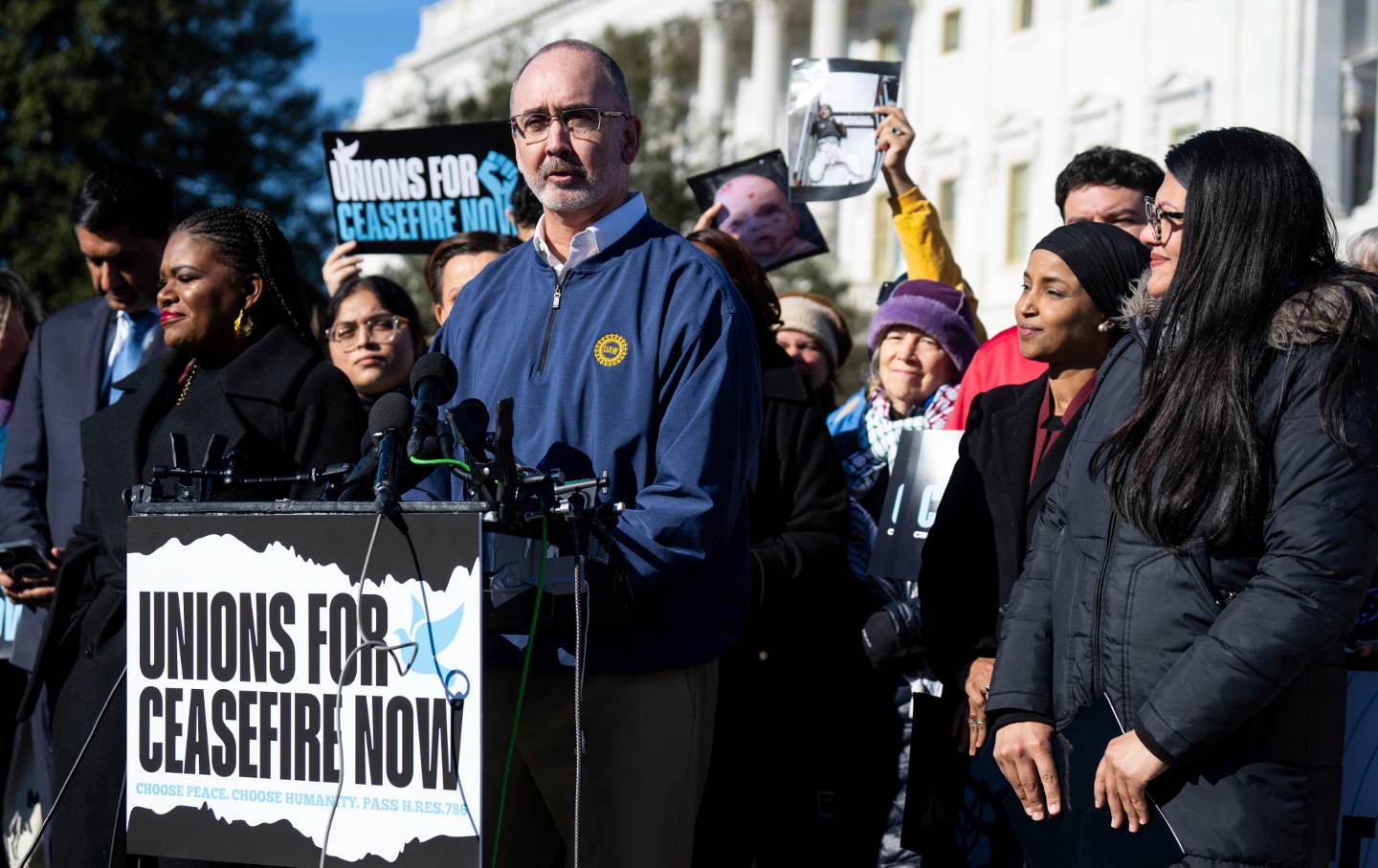
United Auto Workers president Shawn Fain speaks during the press conference with union leaders and supporters of a cease-fire in Gaza outside the US Capitol on Thursday, December 14, 2023.
(Bill Clark / CQ Roll Call / AP Images)As a bleak 2023 comes to a close, no political development this year was as hopeful as the reemergence of the United Auto Workers (UAW). Under its dynamic new leader Shawn Fain, the UAW embraced worker militancy and deployed it in innovative ways. It won big wage concessions from the Big Three automakers for 150,000 workers. And once the UAW’s rolling strikes paid off, Fain wasted no time announcing a new campaign to organize another 150,000.
After a decades-long decline of organized labor in the United States, few expected the UAW to triumph. But perhaps fewer anticipated what the autoworkers’ union did earlier this month. It threw its weight behind “an immediate ceasefire and end to the siege of Gaza,” in the words of an unequivocal statement signed by dozens of unions, including the similarly dynamic Chicago Teachers Union.
With President Joe Biden sponsoring the Israeli decimation of Gaza through arms sales and UN cease-fire vetoes and the toxicity of media discourse that slanders solidarity with the Palestinians as antisemitic, the stance taken by the UAW and its union brethren was courageous. And, as first reported by Jacobin’s excellent labor correspondent Alex Press, it’s just the beginning of the union’s ambitions on US foreign policy.
Three key proponents of the UAW’s decision to oppose Israel’s assault on Gaza told me the cease-fire call will be followed by an internal audit to see if the union’s assets are tied up in Israeli bonds. More broadly, the same late November executive-board vote to endorse the cease-fire also created a political-education panel, the Divestment and Just Transition Committee, which, among other things, will examine the size, scope and impact of the US military-industrial complex that employs thousands of UAW members and dominates the global arms trade.
The committee will “think about what it would mean to actually have a just transition, what used to be called a ‘peace conversion,’ of folks who work in the weapons and defense industry into something else,” said Brandon Mancilla, director of the UAW’s Region 9A, representing 50,000 active and retired workers in New York, New England, and Puerto Rico. “And what that means is a big question. No one has solved that question.”
The group is a long way away from offering answers. But its members know they want to preserve jobs and wages in the factories whose production lines might be put to a different use than making bombs and artillery.
Just as tellingly, few in respectable foreign-policy circles consider the size of the US defense industry a problem to be solved. That’s a measure of how underrepresented the working class is in US foreign policy, no matter how much the defense contractors and the politicians they purchase talk about overpriced fighter jets and irrelevant ship designs in terms of jobs. America’s quest for global dominance primarily serves the interests of giant corporations that suppress labor movements worldwide. “I don’t see the interests of the working class being served in most aspects of US foreign policy, if at all,” said Mike Miller, director of UAW Region 6, representing workers in nine western states, who worked with Mancilla to get the union on board with the cease-fire.
Beyond the long-term step of reexamining defense production, they’ve begun conversations with unions overseas to put solidarity into practice. And that holds out hope for the UAW, like that of the revitalized labor movement more broadly, becoming a crucial, missing counterweight to elite foreign policy.
While US politicians from both parties cover it in euphemism, the proper role they see for the working class in foreign policy is as fodder for factories and battlefields, valorized in rhetoric to obscure their exploitation. Dan Vicente, another force for the cease-fire, saw it up close in a Marine Corps logistics battalion during the 2011 Libya war and the terminal phase of the Iraq occupation. Now, as director of Region 9, he represents 18,000 active and 35,000 retired workers in New Jersey, Pennsylvania, and central and western New York.
“You get there and you realize, oh, these people are poor as shit,” Vicente said. “You got a poor shithead from Philly fighting a poor shithead from fucking, I don’t know, Najaf or somewhere [else] in Iraq. It’s an endless cycle of people who don’t have shit being forced to fight people who don’t have shit.”
Mancilla, Miller, and Vicente all described the push for a cease-fire as emerging from the union’s grass roots. “The minute the war began, our members took to the streets across different locals and units,” Mancilla said. Vicente’s wife is Palestinian, and he credits her with educating her about life in the illegally occupied West Bank. Locals 2865 and 5810 backed deescalation as early as October 28. Miller and Mancilla’s regional groups backed a cease-fire before they all took the issue to the UAW’s international executive board at the end of November. By contrast, Democratic voter opposition to the war is growing, prompting Biden to pantomime criticism of Israel while keeping US weapons flowing there. A foreign policy emerging organically from the working class is likely to be not just more broadly beneficial and far more durable.
The UAW regional directors all say the union’s recent foray into geopolitics is just a start. They also all recognize strong differences of opinion amongst the workers they represent. Miller estimates that close to 40 percent of the autoworker membership voted for Trump in 2016. “Economic nationalism,” he said, constitutes a potent force within a union that’s looking to promote the interests of workers worldwide.
Popular
“swipe left below to view more authors”Swipe →But they also talk about building peace through international solidarity as a responsibility. “I support my guys that make these weapons,” Vicente, who has a General Dynamics plant in his region, said, “and we have a moral obligation to put pressure on politicians to make sure that our products are used for their intended purposes of defense, and not massacres.”
While self-parodic critics like the former publisher of Forbes tell them that geopolitics is over the workers’ heads, they also see their actions as restoring a proud internationalist legacy, citing the UAW’s opposition to South African apartheid and the US-backed Central American dirty wars of the 1980s. And above all, they consider it a key component of a new assertiveness by organized labor that is intimately familiar with betrayal and hostility from the political class.
“We’re gonna get yelled at to stay in our lane, and focus on our jobs or whatever, but we’ve waited for the Democrats forever to become this great institution of working people and peace throughout the world, and they suck. We no longer can trust the Democrats,” Vicente said. “The Republicans straight up tell us they don’t like us. So we’re gonna have to do it ourselves. We’re gonna have to fight for our own better working conditions and lifestyles of the middle class here, and we’re gonna have to advocate for peace around the world.”
More from
Spencer Ackerman 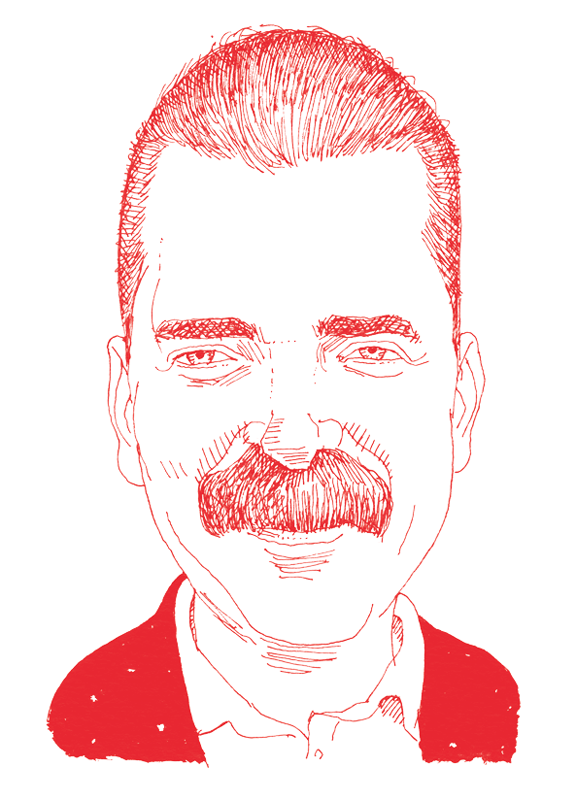
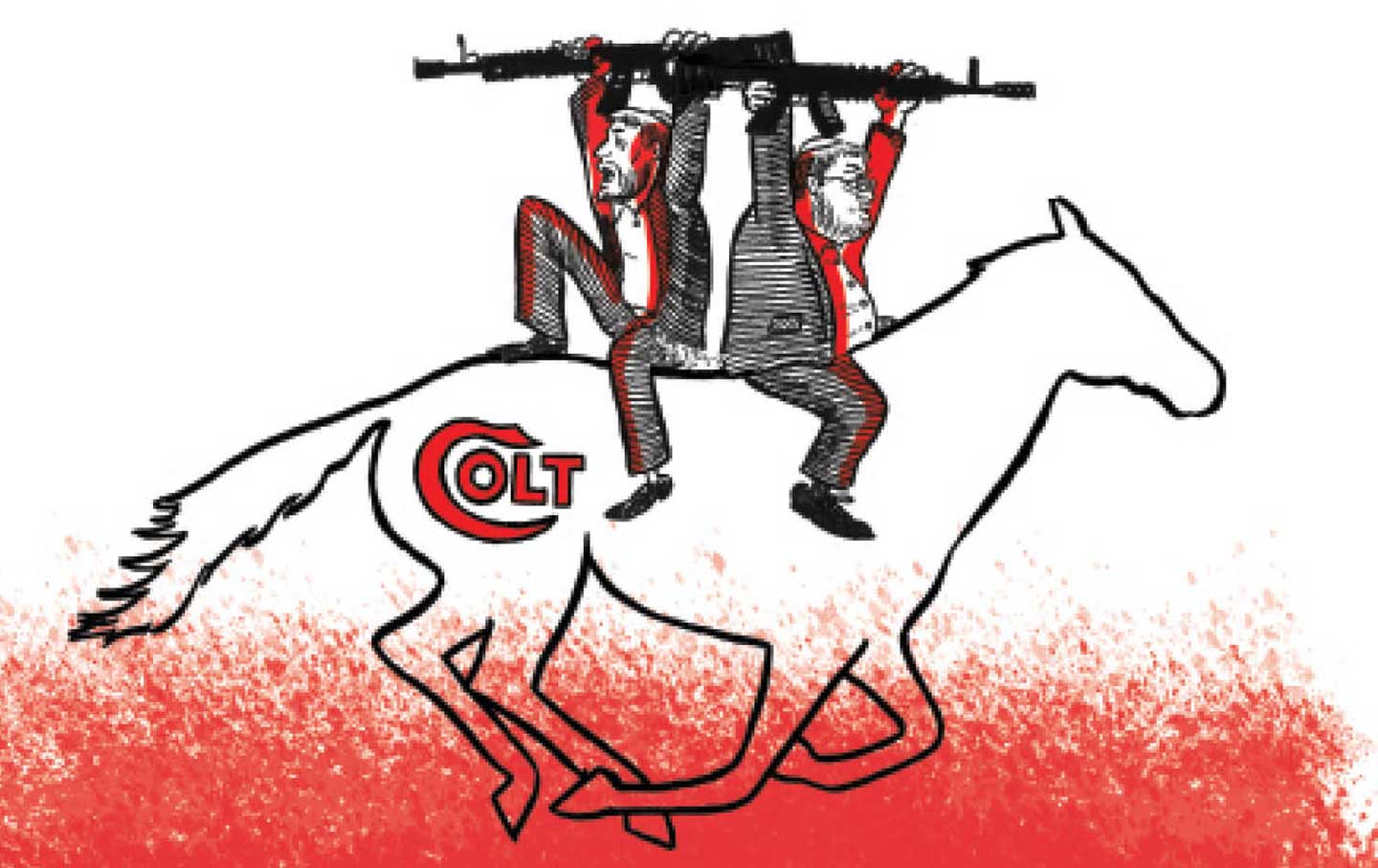
These Corporations Are the True “Winners” of the War on Gaza These Corporations Are the True “Winners” of the War on Gaza
From Colt to Caterpillar, American companies are earning big profits off of Israel’s ongoing assault on Gaza, turning the horrors of war into boardroom victories.
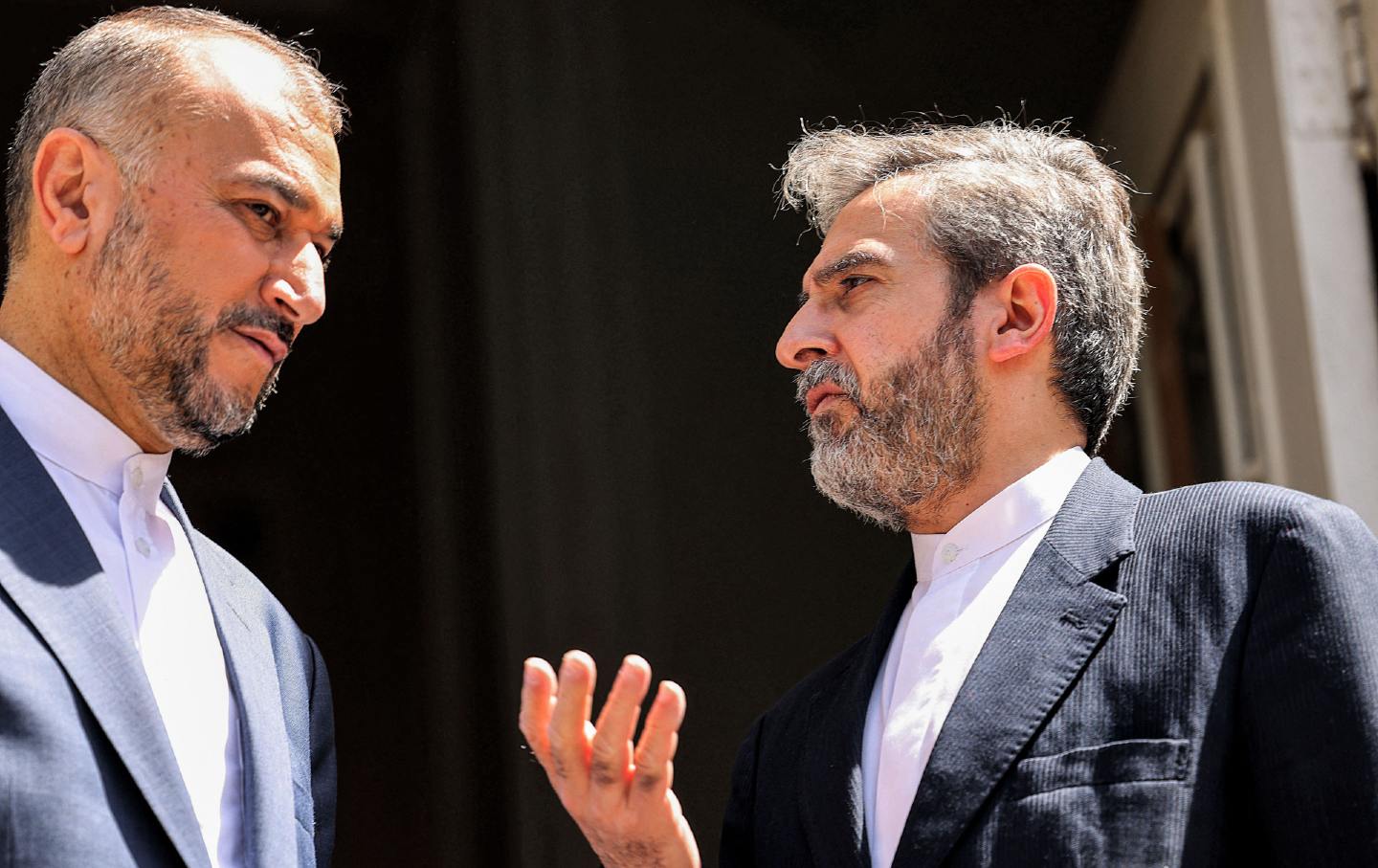
Negotiate With Iran or the Whole of the Middle East Could Burn Negotiate With Iran or the Whole of the Middle East Could Burn
If the US is going to avoid a regional war, Biden has no choice but to talk with Washington’s regional adversary.
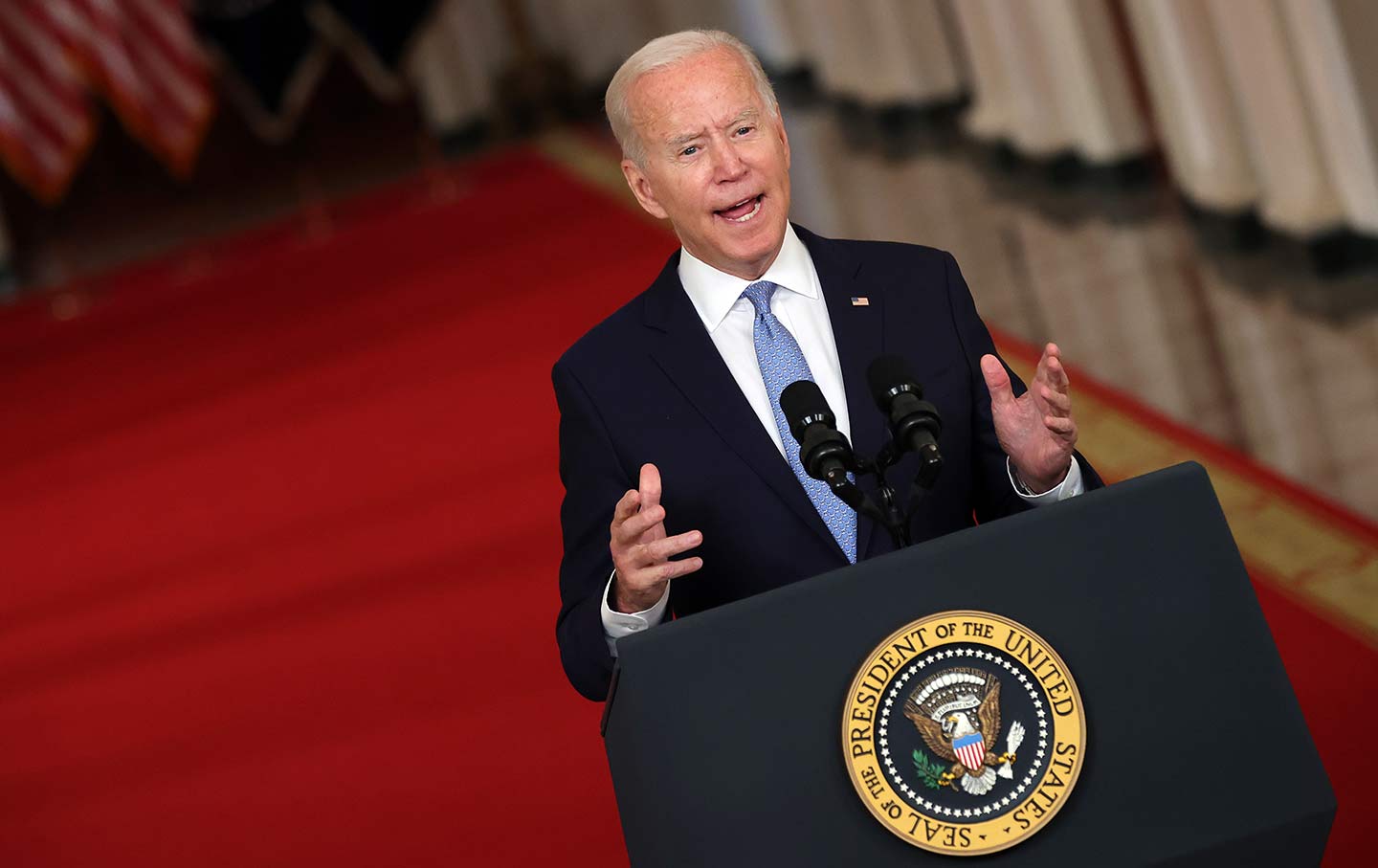
Requiem for the Biden of the Afghanistan Withdrawal Requiem for the Biden of the Afghanistan Withdrawal
The brightest moment in the president’s foreign policy feels like light from a dead star. The Biden of that moment would stop aiding Israeli war crimes.
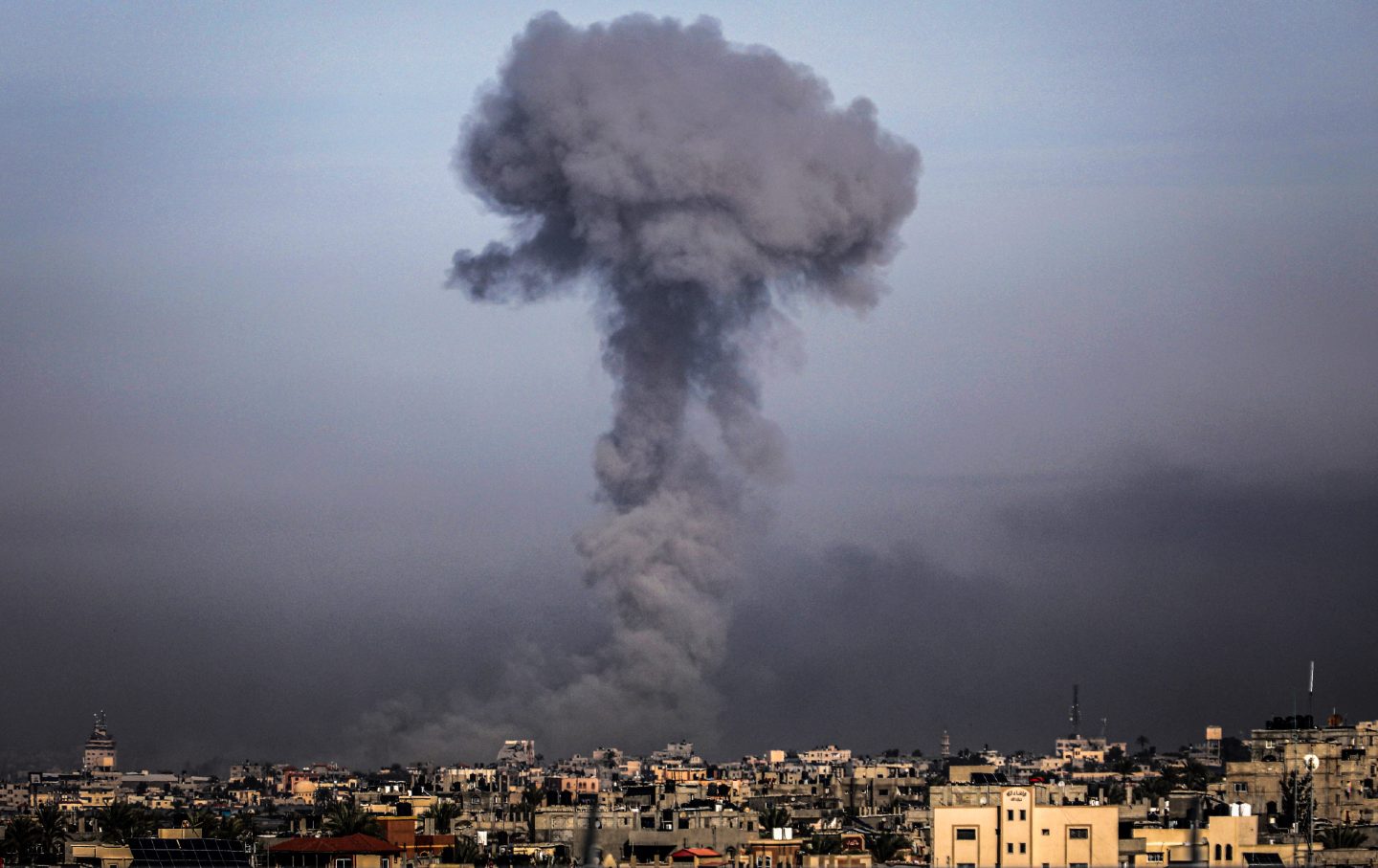
Israel Is Not Promising to “Scale Back” Its War Israel Is Not Promising to “Scale Back” Its War
As the US secretary of state shuttles to stop the war from expanding, the Israeli defense minister vows “months” more war on Gaza and suggests taking the fight to Iran.
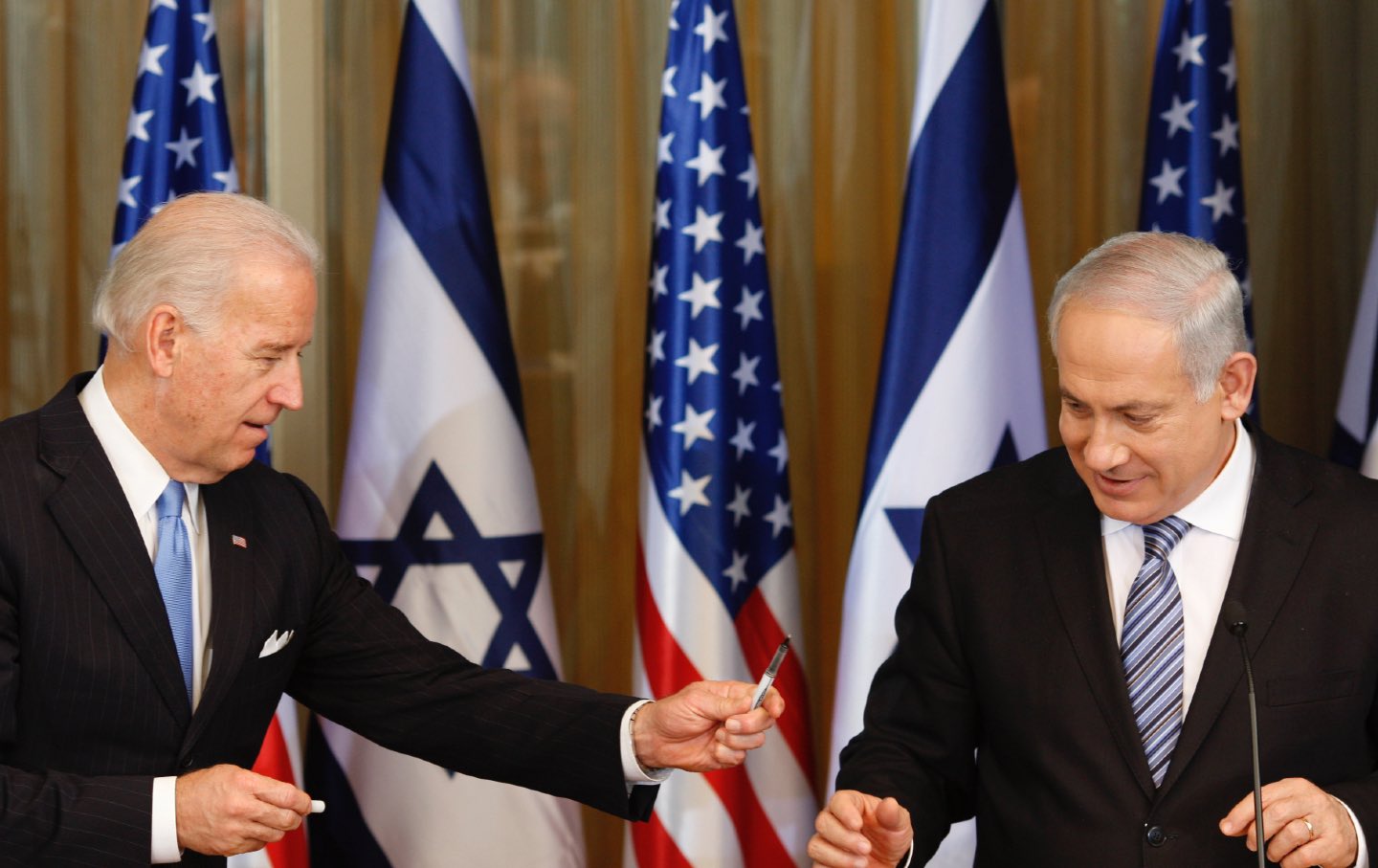
Gaza Shows the Difference Between International Law and the “Rules-Based International Order” Gaza Shows the Difference Between International Law and the “Rules-Based International Order”
World / Forever Wars / December 18, 2023 A Working-Class Foreign Policy Is Coming Adherence to US hegemony determines who does—and does not—get to violate the architecture…
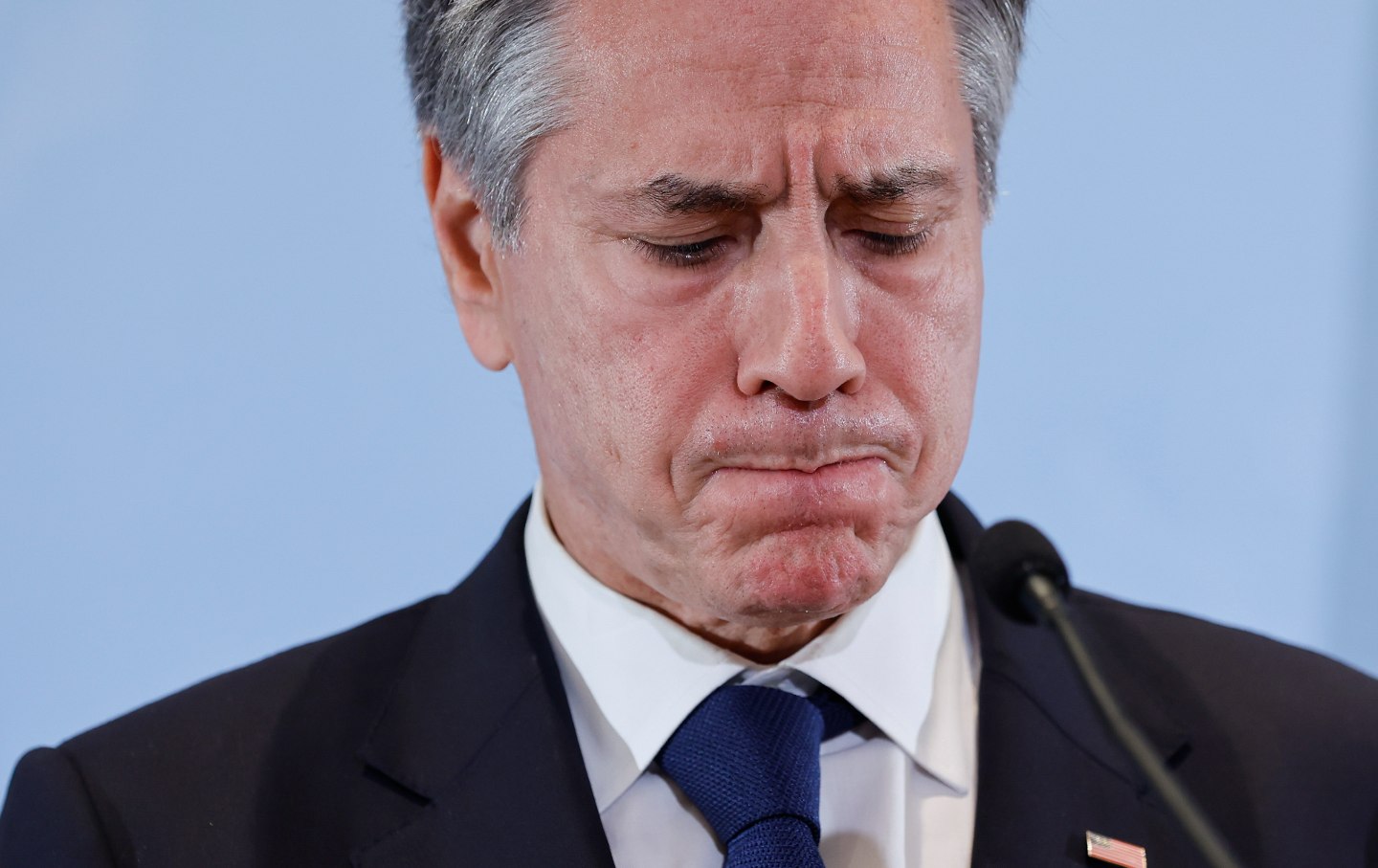
The Weekend Biden’s Middle East Policy Collapsed The Weekend Biden’s Middle East Policy Collapsed
Secretary of State Antony Blinken’s diplomatic trip was a humiliating failure. The administration’s regional approach has gone down in flames.


